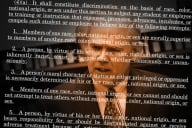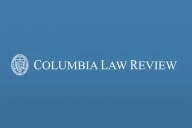You have /5 articles left.
Sign up for a free account or log in.
A hastily released announcement by the University of Colorado system naming the sole finalist to be its next leader is causing heartburn among a few Coloradans -- including a Board of Regents member -- who realized only afterward that they aren't comfortable with a few of the finalist's key congressional votes.
The four-university system’s Board of Regents last week voted unanimously to make Republican former Minnesota congressman Mark Kennedy the sole finalist for the job. Kennedy, who has led the University of North Dakota since 2016, served three terms in Congress, from 2001 to 2007. While in Congress, he voted in favor of restrictions on abortion and against gay marriage. He also voted to support a failed effort to define marriage as between a man and a woman.
As North Dakota's president, Kennedy has also clashed with a member of the State Board of Higher Education after allowing his chief of staff to work remotely from Texas with a $25,000 travel stipend. He has suggested that part of the outcry was because the chief of staff is African American.
In an interview with Inside Higher Ed, Kennedy on Friday said his six-year congressional voting record, which doesn’t reflect his current beliefs on LGBTQ rights, matters less than his slightly longer eight-year record as a professor, university administrator and president. He’ll support Colorado students, staff and faculty, he said, “no matter who they love or how they identify.”
Colorado officials told The Denver Post last week that they rushed to issue a public announcement on Kennedy’s nomination after an April 9 news story in the Grand Forks Herald quoted multiple sources saying he was about to leave North Dakota. Kennedy himself also formally announced last week that he intended to take the Colorado job.
A former top financial official with Pillsbury and Federated Department Stores, Kennedy represented Minnesota in Congress from 2001 to 2007. He initially won a seat in a suburban district southeast of the Twin Cities that was later dissolved. In 2002, he won election to a different district northwest of the Twin Cities. Voters there re-elected him in 2004.
Among other votes that closely aligned with GOP priorities of the time, Kennedy voted in 2006 to support President George W. Bush's veto of a stem cell research measure. The veto override failed in the House, giving Republicans a victory.
Kennedy also voted in 2006 for the Marriage Protection Amendment, which would have amended the Constitution to say that marriage consists only of a union between one man and one woman. It failed in the House. In a statement issued during debate on the amendment, Kennedy complained that "a few local politicians and radical judges" had put traditional marriage in jeopardy, requiring Congress to act. "This amendment would settle the question once and for all, and stop these liberal activists from redefining marriage in Minnesota and the rest of the country."
Mardi Moore, executive director of LGBTQ advocacy organization Out Boulder County, told the Post that she was fielding questions from the community about Kennedy's record. “I’m just disappointed the university did not select a leader with a better record on civil rights,” she said.
Kennedy said his views on LGBTQ issues “have evolved -- and I am committed to showing respect for all of our community.”
In 2011, Kennedy took a job teaching at Johns Hopkins University’s Carey Business School and later directed George Washington University’s Graduate School of Political Management, where he also taught.
Kennedy pointed out that he has spent two years longer in academe than in Congress. “I have a track record as to how I’m responding to defending and protecting LGBTQ+ rights,” he said.
He noted that under his leadership, the University of North Dakota passed a policy banning discrimination and harassment based on sexual orientation or gender identity. The policy, he said, “is at least as strong, if not stronger, than CU’s.”
He also said he appointed LGBTQ staff and faculty -- including an LGBTQ dean -- “and expanded the amount of support” for diverse groups across campus. “So I have a very strong track record and I’m committed to being a champion for all students.”
Kennedy, who has called same-sex marriage “a settled issue,” said, “I am going to be a strong supporter of students, faculty, staff, members of our community, no matter who they love or how they identify. And I will give them my full respect and support and be committed to being a leader for all.” He has said that if he gets the job, the first phone call he'll make is to Colorado governor Jared Polis, the state's first openly gay governor. Polis has not commented on Kennedy's appointment.
Sue Sharkey, chair of the Board of Regents, told the Post that Kennedy is “not running for office. He’s not running for Congress. He’s not going to be making votes in the Legislature. He’s not running a campus like a chancellor. He’s a CEO of a $4.5 billion institution. This is overshadowing the wealth of experience he has to run a university system.”
In a joint statement issued Saturday with Vice Chair Jack Kroll, she said the board spoke with Kennedy "at length" about his stances on same-sex marriage and other issues. "We did not rush and did not compromise in our efforts to find the strongest candidate."
Kennedy, who holds an M.B.A. from the University of Michigan but who does not hold a Ph.D., last year was one of four candidates for the presidency of the University of Central Florida -- he was not selected, the Herald reported, in part because of his congressional votes against same-sex marriage.
Jim Poolman, a former North Dakota legislator who was on the search committee that selected Kennedy in 2016, told the Post that Kennedy's effort to lead UCF so early in his tenure soured North Dakotans a bit on his leadership. “It’s difficult to operate an institution when people think you’re looking at every opportunity to leave,” he said.
Kennedy’s North Dakota tenure has also been marked recently by a quiet dispute with the Engelstad Family Foundation, a major funder, over what the logo on the university’s basketball court should look like. The university in 2016 changed mascots from the Fighting Sioux to the Fighting Hawks, in part because the NCAA and a local American Indian tribe found it offensive.
In emails between Kennedy and a representative of a university benefactor, Kennedy said the “Fighting Hawks” logo should appear, rather than simply “North Dakota,” as the benefactor preferred.
The emails, between Kennedy and Engelstad Family Foundation trustee Kris Engelstad McGarry, whose late father underwrote a $110 million hockey arena, show that Kennedy was frustrated by the foundation’s push to leave out the hawk logo. McGarry told the Associated Press that many longtime North Dakota fans “do not identify with Fighting Hawks” and would be alienated by the logo. “We believe that the community should make their own decisions and that the change should happen more organically, over time, rather than have it pushed,” she said.
Colorado regent Linda Shoemaker told the Post that it was “unfortunate” the university system had to release Kennedy’s name prematurely, “because we didn’t even have the opportunity for our own staff to do the vetting that we would have expected to be done prior to announcing this finalist.”
She said the Board of Regents met on April 3 and 4 at Denver International Airport to interview six candidates selected by the system’s presidential search committee. The system has not named the other five candidates, but Shoemaker said each was interviewed for two hours.
One regent, Lesley Smith, told the Boulder, Colo., Daily Camera that regents didn’t discuss Kennedy's voting record during his interview, but that he discussed his support for gay people while answering a question on diversity. The board was satisfied with his answer, but Smith said she is "getting a lot of pushback from constituents" on his congressional voting record.
She tweeted last week, "Some information about Mark has come to light that is concerning; my colleagues and I will be exploring this further."
Smith said she sent the tweet in response to others tweeting critiques of her support of Kennedy. "We all want to be aware of anything that might be a flash point," she said.
The Herald earlier reported on a controversy surrounding Kennedy's decision to keep Angelique Foster, his chief of staff, on board working remotely from Texas -- a move criticized by at least one state Board of Higher Education member. Kennedy has said the arrangement was meant to be temporary but that he extended it because he couldn’t find a qualified replacement.
In an interview with the Daily Camera, Kennedy said part of the criticism was because Foster is African American. "I'm quite confident it is about more than remote working," he said, but he later told the newspaper that he didn't want his comments on race to be overblown. "North Dakotans are very welcoming, inclusive people that have made Angelique feel warmly received," he said.
Kennedy has said he'll visit the university system's four campuses the week of April 22. State open-records law dictates that finalists for the university job must wait 14 business days after their names are revealed before regents can vote on the appointment. In the meantime, a protest against his candidacy is scheduled for today in CU's Norlin Quad.
Asked if he was frustrated by the finalist process, Kennedy said he’d let the University of Colorado answer such questions. “I have no comment on the process.”
But he added that there are “lot of things germane to the discussion that a lot of people aren’t talking about, like: ‘What are the skills you really need to provide leadership to a system of the scale and potential impact of the University of Colorado?’”
Kennedy said any leader of such a large system needs “a trifecta skill” consisting of business and management acumen, an academic background and the ability to engage with different public constituencies.
“Whatever kind of engagement it takes, discussing whatever topics people want to first talk about before we get to ‘How are we are going to elevate the university in its impact?’ I’m happy to do -- and it’s an important part of the job.”
Kennedy may need to tread lightly in Colorado over the next few weeks, since the intense media coverage of his candidacy has prompted North Dakota University system chancellor Mark Hagerott to say he considers the news a “de facto notice” of Kennedy’s resignation.
In a letter sent to Kennedy Friday and obtained by the Herald, Hagerott said that while he hadn't received a formal notice of resignation, he would treat Kennedy's April 10 statement "along with your statements to the media outlets since then, as a de facto notice of resignation effective June 15, 2019."
Reached late Friday by the Herald, Kennedy said he should have clarified his statement.
“I maybe should have put ‘we would be sorry to leave UND.’ It is not a final deal. It is highly unusual that it is not the final selection, but that option remains until the regents vote again in two weeks.”








